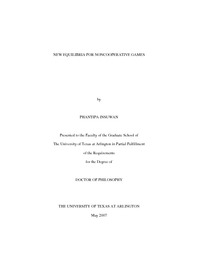
ATTENTION: The works hosted here are being migrated to a new repository that will consolidate resources, improve discoverability, and better show UTA's research impact on the global community. We will update authors as the migration progresses. Please see MavMatrix for more information.
Show simple item record
| dc.contributor.author | Insuwan, Phantipa | en_US |
| dc.date.accessioned | 2008-08-08T02:31:00Z | |
| dc.date.available | 2008-08-08T02:31:00Z | |
| dc.date.issued | 2008-08-08T02:31:00Z | |
| dc.date.submitted | May 2007 | en_US |
| dc.identifier.other | DISS-1680 | en_US |
| dc.identifier.uri | http://hdl.handle.net/10106/895 | |
| dc.description.abstract | In this dissertation we present an alternative to the Nash Equilibrium (NE), which is regarded as the fundamental solution concept in game theory. An NE provides a solution in which no player can improve his payoff by unilaterally changing strategies. However, the NE has weaknesses as exemplified by the paradoxical Prisoner's Dilemma game, where the unique NE is dominated by another possible outcome. Moreover, an NE assumes all players select their strategies according to the same NE so equilibrium holds. For multiple NE's, no standard approach exists for selecting a single one, though various refinements such as perfect Nash equilibria have been suggested.
An NE is characterized by its minimizing each player's expected regret for any fixed strategies of the other players. We present a complementary equilibrium based on the notion of disappointment, where disappointing oneself is regret. Our new equilibrium is called a Disappointment Equilibrium (DE). In a DE, for every player i, any or all players except i can change strategies and possibly decrease i's payoff, while certainly never making i's payoff better. Remarkably, the same DE has this property for every player i. A DE thereby enforces equilibrium with an implicit cooperative property based on the possible loss and certain non-improvement of payoff that any player might incur from some opponent's change of strategy. Such cooperation may be better for players than an NE, as in Prisoner's Dilemma. Thus a DE demonstrates that the requirements for an NE are not necessary conditions for a rational solution.
We prove that a DE always exists, provide a method to compute one, and present examples. We also show that the DE is a dual equilibrium to the NE. In an NE, each player is assumed to act out of self-interest, while in a DE each player acts out of concern for the action of the other players. This duality is particularly useful in two-person games. We also define a Pareto Intercession Equilibrium (PIE) that represents a compromise between the NE and DE solution criteria. Together, the new concepts of a DE and PIE resolve some important issues in game theory. | en_US |
| dc.description.sponsorship | Corley, Herbert W. | en_US |
| dc.language.iso | EN | en_US |
| dc.publisher | Industrial & Manufacturing Engineering | en_US |
| dc.title | New Equilibria For Noncooperative Games | en_US |
| dc.type | Ph.D. | en_US |
| dc.contributor.committeeChair | Corley, Herbert W. | en_US |
| dc.degree.department | Industrial & Manufacturing Engineering | en_US |
| dc.degree.discipline | Industrial & Manufacturing Engineering | en_US |
| dc.degree.grantor | University of Texas at Arlington | en_US |
| dc.degree.level | doctoral | en_US |
| dc.degree.name | Ph.D. | en_US |
| dc.identifier.externalLink | https://www.uta.edu/ra/real/editprofile.php?onlyview=1&pid=263 | |
| dc.identifier.externalLinkDescription | Link to Research Profiles | |
Files in this item
- Name:
- umi-uta-1680.pdf
- Size:
- 926Kb
- Format:
- PDF
This item appears in the following Collection(s)
Show simple item record


